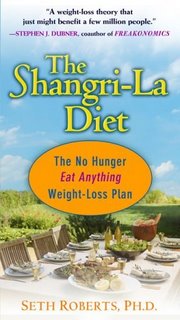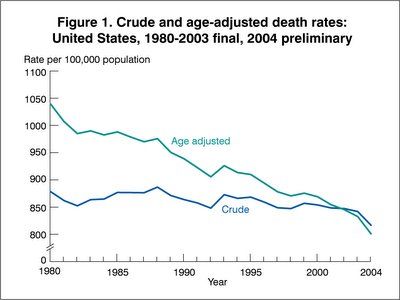
I
blogged about this when it was featured in the Freakonomics section of the NYTimes magazine (that column can be found
here). Now, Seth Roberts, a professor of psychology, has a
book coming out about his unusual diet.
Briefly, Roberts used himself as a lab rat and tried a variety of diets to try and lose weight. He hypothesized that the body has a "setpoint" which is the weight it thinks it should way. If you weigh more than your setpoint, you will not feel hungry or want to eat much. If you weigh less, you'll obsess about food and tend to eat more. This concept has considerable empirical support and explains why while many dieters succesfully lose weight, so few can keep it off: will power or an unusual diet works for a while but it is very difficult to keep it up.
Based on his experience drinking unusual sugared sodas while on vacation, Roberts hypothesized that regular intake of a small numbers of calories with no flavor (or, it turns out, just sweetness) would reset the setpoint allowing him to lose weight. Depending on whether you believe the NYTimes article or the book he lost somewhere between 30 and 40 pounds over a period of 3 months, by taking in a few hundred calories as either extralight (and therefore almost flavorless) olive oil or water sweetened with fructose. Otherwise he ate what he wished, but he found he didn't have much an appetite.
He believes that other light oils like canola or table sugar (sucrose) in water work just as well. He cut down the number of calories taken in this way once he got thin enough and has managed to keep the weight off.
The extent of the empirical evidence is his weight loss and that some friends have also lost weight this way. No animal trials, no human trials, nothing. He does quote a few commentors on blogs who had initial succes with the diet after the Freakanomics feature. I'd have a lot more faith that this would work if there were more data. He quotes a bunch of animal research that has some relevance to his theory but no direct tests of this diet. (The Penguin site does note that "f
formal clinical trials will soon be under way" whatever that means; the skeptic in me wonders if the trials aren't working so they are getting the book out before it becomes clear this method doesn't work for most people).The theory underlying the diet, which seems to be that taking in bland calories signals scarcity while taking in lots of familiar, highly flavored foods signals abundance doesn't seem very intuitive to me; lab mice and rats along with many other animals stay thin on chow. In fact, in his extra credit chapter which gives other tips for losing weight is sometimes self-contradictory, simultaneously advocating eating a variety of unusually flavored foods and eating bland food like cottage cheese. He does rail against fast food as too many calories that taste the same everytime.
Besides the anecdotal nature of his success, the book feels as though it was thrown together in a hurry to capitalize on the media exposure he was getting (I think he also appeared on Good Morning America or elsewhere). It is 176 pages, but the information could have fit in half that number. Like the proverbial term paper, they seem to have used every trick to make it longer: small pages, big margins, etc.
Finally, Roberts seems to have an unusual relationship to food and eating. One of the benefits he sees in the diet is the time he saves. He currently eats only one small meal a day, and doesn't seem to miss the rest. I can remember a number of great meals I've eaten, but if Roberts has similar memories, he doesn't share them in the book.
I love food and I love eating. I'm pretty sure I'd abandon any diet where I only had appetite for one small meal a day, and I'd miss the pleasure of eating tasty food if I was so limited. I don't sense Roberts has even considered that. I suspect that even if people lose weight on this diet, they'll gain it back as they either grow tired of plain oil and sugar water or miss the experience of eating.
That said, it seems to work. I'm never shy about trying a preposterous new diet and I could always lose a few lbs. so I've given this one a shot for the last week. I haven't been regularly checking my weight, but the decreased appetitie is noticeable. I fill up on much less food than typically, although still much more than Roberts eats. I should note than I'm big, exercise a lot and usually eat quite a bit. Now I'd say that a reasonable portion is enough for me, but I still eat three good meals a day.
The drinking sugar water or oil isn't too bad, although to avoid establishing taste-calorie connections in your brain you have to not take in anything flavored (food, drink, even brushing your teeth seems to count) for an hour before or after, which means you have to plan a bit.
Of course, every diet works at the start. I'll keep Dr. Andy readers updated about how I'm able to keep this up overtime. You may remember I succesfully lost 15lbs by fasting one day a week. That diet works well but requires an enormous amount of willpower, going to be at night, having had no calories for 24 hours with a full refrigerator downstairs. If I ever decide to get really thin for a race, I may try combining the diets and fast a day a week except for some plain oil or sugar water.
FULL DISCLOSURE: The book is not out yet. Some publicist from Penguin emailed me to ask if I wanted a copy to review and I said yes. So I did get the book free, but I have no other financial interest. I suspect Dr. Roberts will soon be a wealthy man, whether or not his experience turns out to be generally applicable.
UPDATE: follow my weight loss
here.


